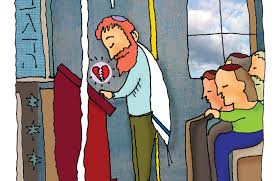In the Torah reading this coming Shabbat we will read of Aharon’s silent reaction to his sons’ death. A reaction which the commentaries view as praiseworthy. In the millennia which followed Aharon, the Jewish people have developed an impressive array of practices surrounding death and mourning. The vast majority of these practices, including the recital of a Mourner’s Kaddish and leading prayer services for a year after a parent’s death, belong to the category of minhag (custom) rather than halacha. Many are surprised to discover that these customs, which are often talked of in terms of “chiyuv” (legal obligation), were entirely absent from Judaism 1,000 years ago.
The origin of kaddish in general – and the mourners’ kaddish in particular – have been lost in the mists of time. Kaddish may be obliquely referenced in the Talmud but it is not found in connection with any framework of obligatory prayer. (A post-Talmudic legend concerning a son saying “Borechu” and saving the father from Gehinnom does not appear to be reflected in any Talmudic halacha – or even Aggadah of Chazal). One is hard pressed to find formal instruction concerning the Mourners’ Kaddish in the works of the early Rishonim – it is a custom whose origin and growth may well coincide with the rise of Kabbalah towards the end of the era of the Rishonim. Yet Kaddish for those in mourning or observing annual “yarzeits” for relatives have become so elevated in the communal consciousness that it is rigorously recited even by those who otherwise will rarely attend shul or observe Jewish law. In some circles this has even become a business, with people paid handsomely to recite Kaddish regularly on behalf of the son of a deceased.
At first glance, Kaddish is a shining example of a positive and widely-accepted custom which provides numerous benefits and few drawbacks. It plays an important part of the healing process for those experiencing grief, providing an active way for them to channel their emotions through recitations of prayers. The communal dimension of this custom offers additional benefits with mourners caused to regularly surround themselves with fellow worshippers rather than sit at home alone and dwell upon their loss. From a religious perspective, there is copious anecdotal evidence of people re-engaging with their shuls and prayer services in a way that lasted well beyond their year of mourning. Some tell of parents who are motivated to give their children a basic Jewish education “so at least they can say kaddish for me when I’m gone”. If nothing else, it allows grieving children to honour their deceased parents in a final show of respect, sometimes helping to allay pangs of conscience for potential breaches of this honour while they were alive.
When we move to examine the theological side of Kaddish and these more recent customs relating to mourning things start to become more complicated. It can be argued that the very premise which led to the explosion in popularity of Kaddish and Mourner-prayer rituals – that its recitation can redeem or elevate the souls of the dead – was far from the mainstream Jewish position.
The most prominent theological approach which emerges from “older Judaism” with regard to vicarious-third-party assistance for the soul of the deceased is striking. Sherira and Hai Gaon both state explicitly that one cannot provide any merit for someone who is dead; they are judged solely on the basis of their own merits – “even if all the righteous people in the world were to pray and perform charity/kind deeds on his behalf it cannot raise him” (Otzar HaGeonim, Chagigah #22). In a similar vein, Rav Nissim Gaon is quoted in the Sefer Chassidim (#605) as saying that there is no way to pray for the wicked so that they enjoy the fate of the righteous for their judgement is based solely on their own merits; its is “inconceivable that someone can perform evil deeds and gain absolution through another’s prayer”.
A similar position is advanced by Rambam in his commentary to Avot 4:22 (or 4:17 in some editions). Drawing upon a teaching in Kohelet (9:10) that “there is neither deed nor reckoning, neither knowledge nor wisdom in the grave, where you are going”, Rambam emphasizes that the level of merit and connection to God that one achieves upon death is the one with which he remains for eternity: “there is no advancing or acquisition after death of any matter which a person fell short in”. These teachings of Rambam and the Geonim would appear consistent with a whole host of Talmudic teachings which identify this World as the place for performing deeds and gaining merit, and the World to Come as the place to receive reward.
While we may be able to understand how children and students, inspired by the Torah and good deeds of a deceased mentor, can provide merit for his soul, it is difficult to fathom what system of justice and truth could allow for a person’s fate to be influenced by the unconnected deeds of others after their death.
Furthermore, can we imagine that Talmudic sages were aware of such a possible correction for souls of the deceased yet neglected to tell anyone or instruct children to pray for their dead parents? Or are we to assume that variations of these practices were somehow observed but never formally written or alluded to in any halachic or other Jewish works?
First posted on Facebook 31 March 2024, here.




